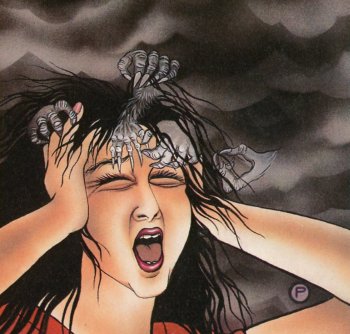Wasting your Life
The deluded, imagining trivial things to be
vital to life,
follow their vain fancies and never attain the
highest wisdom.
But the wise, knowing what is trivial and what
is vital,
set their thoughts on the supreme goal and
attain the highest wisdom.
Buddha - The Dhammapada - Twin verses 11-12
Gadgets go on accumulating and the soul goes
on disappearing;
machines go on growing and man goes on
disappearing. (Osho 1979!)
Note this is a continuation of: From
Robopathology to Enlightenment
We are flooded by advertisements, using advanced techniques, which
are based on neurological research of the effect of advertising on
our brain. This kind of research costs millions of dollars.
It looks e.g. at similarities between the way our brains respond to
religious and spiritual symbols, and the way our brains react to
products or brands. Finding that certain products inspire the same
sense of devotion and loyalty in us, as provoked by faith or
religion. Companies are borrowing from the world of religion to
advertise their products.
Depression is called the soul weeping,
 For
loosing our religious (soul) values we have to pay a high price. For
loosing our religious (soul) values we have to pay a high price.
Depression is called the soul weeping, because with all the clever
advertisements we are substituting religious (soul) values by
commercial ego/greed values.
If
we look to the
depression figures for the United States, the country which
the most prosperity and gadgets, it is easy to see that this all
doesn’t make people happy.
Depression is a chronic illness that exacts a significant toll on
America's health and productivity. It affects more than 21
million American children and adults annually and is the leading
cause of disability in the United States for individuals ages 15 to
44.
Lost
productive time among U.S. workers due to depression is estimated to
be in excess of $31 billion per year. Depression frequently
co-occurs with a variety of medical illnesses such as heart disease,
cancer, and chronic pain and is associated with poorer health status
and prognosis. It is also the principal cause of the 30,000
suicides in the U.S. each year. In 2004, suicide was the 11th
leading cause of death in the United States, third among individuals
aged 15-24. The
United States is the country with the
highest percentage of depressive people (9.6%)
A
recent (Nov 2010) study in the Netherlands: hidden suffering,
depression among the youth, shows that anxiety and depression
are a much bigger problem among young people than was known until
recently. Fifteen percent of children, aged under 18
years, ever experienced a depressive period.
This
has serious consequences: depression or similar symptoms can
seriously affect the school career. It is not uncommon that
aggressive or criminal youngsters also suffer from anxiety or
depression. The social costs of these problems are also much higher
than previously assumed.
In
my youth I never heard the word depression. With my friends we
played in nature, making huts and inventing all kinds of games. We
went on adventure and discoveries. The only medium we had was the
radio without any commercials. We listened to radio plays in which
our own creativity visualized all the scenes.

|
While visiting a remote mountain village in the Himalayas I saw a
group of kids playing with almost nothing. A simple ball, a wooden
stick and some wooden poles. I have never seen kids having so much
fun together. Having nothing and being so happy.
And then this photo of a kid sitting on a market in a poor village
in Laos, beaming with happiness!
I will also never forget the scene of a woman, living in a simple
hut at the banks of the river Ganges in India. She was sitting on a
rock in the rays of the sun and she gave her baby an oil message. An
aura of love and happiness surrounded her and the baby. Poor in our
consumer eyes, but rich for the ones who can see.
|
|
Prevalence of depression

Click to enlarge
Source |
A recent study confirmed my observations.
A study, conducted by researchers from the State
University of New York at Stony Brook as part of the
WHO's World Mental Health Survey Initiative. The
first international survey of its kind, published on
July 26 2011 by esteemed American journal BMC
Medicine.
Some 90,000 people were probed on their mental
health histories in 18 low- and high-income
countries.
The results are impressive – while participants
from low-income countries appeared less likely to
suffer from depression at some point in their life,
those from high-income nations seemed far more
likely to suffer. |
The commercial manipulation and misuse of
religious values
to make consumer robots of people.
Nowadays with all this watching and
consuming, constantly interrupted by commercials, on TV, your
laptop, mobile or iPad. I don’t think that killing aliens on
your computer will make you happy (13-12-2010: World of Warcraft:
Cataclysm sells 3,3 million in the first 24 hour). Seeing the enormous number of iPads
already sold and the many new tablet computers coming soon, it is
clear that the consuming trend is becoming even stronger.
Please note, that I have nothing against all these possibilities. I
have always been a pioneer in using modern devices. I already
worked with a computer in 1961, and was a proud owner of one the
first personal computers in Europe in Jan 1971 a Wang 2200, costing
€ 20.000 with 16kB memory.
Also the Internet is a great source of information: I have 20
websites on it, reaching the whole world. But I use my gadgets
mostly as a means to create and share, not almost only to consume
and to maintain superficial meaningless contacts.
I want to show you evidence on how people are manipulated to become
consumer robots, even at their religious core values. As told
already I am a scientist too, in this way I can always prove it.
After publishing the robopath
article I felt that I had to write more. I went into town,
just to have a break and a haircut. Walking through town I passed a
Vodafone shop, which I never visit because I (and others) had really
bad cheating experiences with Vodafone. But suddenly I walked into
the Vodafone shop, found a magazine, took it home, opened it and
there was the perfect article to prove my point of view. For me,
this is always a strong sign that it has to be published.

WHOIS APPLE.COM
Although this article is about Apple, their marketing approach is an
example for many companies.
I will give some translated quotes from the Dutch magazine Bright 36
:
WHOIS APPLE.COM
Jobs (the boss of Apple) invents products, which people don’t
really need, but want to have at any cost. Ive as senior VP
industrial designer, cares for the slick design, which fuels the
greed as much as possible.
Adjacent to his dictatorial leadership, there is Jobs overwhelming
charisma powered by a surplus of persuasion, which some have called
the reality distortion field. He knows how to convince
customers that Apple is not just a technology company with funny
innovative products, but a way of life, so that thanks to
‘people like us' with magic and revolutionary
products, we can make a decisive contribution to a "new and better
world".
The Nobel Prize winning writer Umberto Eco reflected the difference
between Apple and Microsoft twenty years ago, as the difference
between the Catholic and Protestant church. "In the DOS universe
many paths lead to personal salvation," said Eco. "The only true
Apple church dictates its followers step by step on how to get
there." Since then, dissidents regularly draw the parallel between
Apple adepts and religious sect members with a tunnel vision.
 In
his book
Buyology marketing guru Martin Lindstrom even gives
scientific evidence for the religious link. Lindstrom spent millions
of dollars on pioneering neurological research on the effect of
advertising on our brain. When two thousand persons were shown the
Apple logo (I found 18 million images on Google, looking for this
logo!), the same brain areas were active as in religious
practitioners. Lindstrom talks about a "consumer faith”, by
which the stress of an increasingly chaotic world outside is
softened by the ‘illusion of control'. As missionaries
centuries before, lured natives into the church with mirrors and
other shiny trinkets, the nowadays pagans are attracted to shiny, in
lyrical sermons dipped, techno gadgets. In
his book
Buyology marketing guru Martin Lindstrom even gives
scientific evidence for the religious link. Lindstrom spent millions
of dollars on pioneering neurological research on the effect of
advertising on our brain. When two thousand persons were shown the
Apple logo (I found 18 million images on Google, looking for this
logo!), the same brain areas were active as in religious
practitioners. Lindstrom talks about a "consumer faith”, by
which the stress of an increasingly chaotic world outside is
softened by the ‘illusion of control'. As missionaries
centuries before, lured natives into the church with mirrors and
other shiny trinkets, the nowadays pagans are attracted to shiny, in
lyrical sermons dipped, techno gadgets.
Like Christianity, Apple developed from a relatively insignificant
niche player to a superpower with puritanical and totalitarian
tendencies. And just as St. Peter guards the gates of heaven, Jobs
watches over his iTunes and App Stores, the exclusive gates of a
modern consumer heaven.

Greed
The conscious people will immediately understand what is happening
here: manipulation on a grand scale with the use of all the
scientific research available today, exploiting our spiritual core
needs.
Let us go back to the first quote, which in essence already says it
all:
Jobs invents products, which people don’t really need, but
want to have at any cost. Ive as senior VP industrial designer
cares for the slick design, which fuels the greed as much as
possible.
And more or less this making people greedy for things they don’t
really need is used in most of the marketing. Combined with
promises of a happier and more fulfilling life. Of course happiness
and fulfillment come from being, they are inner qualities, and they
never come from greed: having (more and more) possessions.
Greed is seen as one of the ‘deadliest sins’ by all the major
religions.
As usual Osho gives us his brilliant vision on
greed in the Guest
GREED is an effort to stuff yourself with something – it may
be sex, it may be food (in 2010 nearly 34 percent of adults in
America are obese), it may be money, it may be power. Greed is
the fear of inner emptiness. One is afraid of being empty and one
wants somehow to possess more and more things. One wants to go on
stuffing things inside so one can forget one’s emptiness. But to
forget one’s emptiness is to forget one’s real self. To forget
one’s emptiness is to forget the way to God. To forget one’s
emptiness is the most stupid act in the world that a man is capable
of.
 But
why do people want to forget? We are carrying an idea given to us by
others that emptiness is death. It is not! It is a false notion
perpetuated by the society. Society has a deep investment in the
idea, because if people are not greedy THIS society cannot exist.
If people are not greedy then who is going to be mad after money,
after power? Then the whole structure of this power-oriented society
will collapse. If people are not greedy, who is going to call
Alexander ’the Great’? Alexander will be called ’the ridiculous’ not
’the Great’, ’the stupid’ not ’the Great’. Then who is going to
call the people who go on and on possessing things respectable?
Who is going to give them respect? They will be the laughing-stock!
They are mad, they are wasting their lives. Then who is going
to pay respects to the prime ministers and the presidents of the
countries? Then people will think that they are neurotic. But
why do people want to forget? We are carrying an idea given to us by
others that emptiness is death. It is not! It is a false notion
perpetuated by the society. Society has a deep investment in the
idea, because if people are not greedy THIS society cannot exist.
If people are not greedy then who is going to be mad after money,
after power? Then the whole structure of this power-oriented society
will collapse. If people are not greedy, who is going to call
Alexander ’the Great’? Alexander will be called ’the ridiculous’ not
’the Great’, ’the stupid’ not ’the Great’. Then who is going to
call the people who go on and on possessing things respectable?
Who is going to give them respect? They will be the laughing-stock!
They are mad, they are wasting their lives. Then who is going
to pay respects to the prime ministers and the presidents of the
countries? Then people will think that they are neurotic.
Just think of a world where people are not greedy – then the
rich person will be thought neurotic, the politician will be thought
neurotic. Then the people who are constantly hankering for attention
will be thought retarded. And if people are not greedy we will have
a totally different world, more beautiful. There will be fewer
possessions certainly, but more joy, more music, more dance, more
love. People may not have many gadgets in their houses, but
people will be more alive. Right now we go on selling our life
energies for gadgets. Gadgets go on accumulating and the soul goes
on disappearing; machines go on growing and man goes on
disappearing.
When the world is non-greedy, people will be playing on the guitar,
on the flute. People may be sitting silently under trees,
meditating. Yes, people will be doing things but only to the
extent that is absolutely necessary. People will be fulfilling their
needs, but needs are not desires; desires are unnecessary, needs are
necessary. And desires never end. Needs are simple and can be
fulfilled, but desires go on asking for more and more. They go
on desiring for even more of the same thing that you have. You have
one car, the desire says have two; unless you have a two-car garage
you are nobody. You have one house, desire says have two – at least
one in the hills. And when you have two the desire says have three,
one in the hills, one on the seashore, and so on, and so forth.
Needs are small: yes, you need food, shelter, you need a few
things. Everybody’s needs can be provided for; the world has enough
to fulfill everybody’s needs; but desires... it is impossible.
Desires cannot be fulfilled. And because people are fulfilling their
desires millions of people’s needs are not fulfilled.
But basically greed is a spiritual problem. You have been taught
that if you don’t have many things you are nobody, and you are also
afraid. So people go on stuffing themselves. It does not help;
at the most it gives you a temporary relief, but sooner or later you
start feeling the emptiness again. Then you fill it again. And
the inner emptiness is the door to God. But you have been told
that the empty mind is the devil’s mind or the devil’s workshop;
that is absolute nonsense. The empty mind is the door to God. How
can the empty mind be the devil’s workshop? It is in the empty mind
that the devil dies completely. The devil means the mind, the empty
mind means no-mind. And greed is one of the most fundamental
problems to be encountered. You have to see why you are greedy:
because you want to keep yourself occupied with things. Possessing
more and more you remain occupied, engaged. You can forget all about
your inner world, you can go on saying to it: “Wait! Let me have
this much more, and then I am going to turn towards you.” And it is
always death that comes before your desires are fulfilled. Even if
you live for a thousand years your desires are not going to be
fulfilled.
If you are intelligent you will see the futility of greed. If
you are intelligent you will start living rather than preparing to
live. Greed is preparing to live. And you can go on preparing, and
the time to live will never come. If you are intelligent you will
not miss today for tomorrow. You will not sacrifice this moment for
another moment, you will live this moment in its totality. You will
squeeze the whole juice out of this moment.
Extract from:
Osho The Guest chapter
2: The time has come to be free (pdf)
Question 3: What is Greed 27 April 1979 Buddha hall

Wasting your life
I am lucky to have lived in the hippy time, where people were
playing on the guitar, on the flute. People were sitting silently
under trees, meditating. People had time just to be and enjoy.
People had time for each other to really communicate and love.
Parents had time for their kids, which turn out to be so important.
That is the energy that nourishes them: lovely attention of their
parents.
Now at already young age, the kids are thrown in a crèche, taken
out in the evening by an overworked and stressed mother, put in
front of the TV and having a meal watching it and then to bed.
Parents so tired that there is no time left to enjoy each other etc.
The whole world stressed in ecological and final crises, what a
progress we have made.
Yes, the hippies were doing things but only to the extent that is
absolutely necessary. And they had the vision that the new man
would be: “Homo Ludens”, the playing creative human being.
The machines would do the work for us. How sadly wrong the hippies
have been, we have become the slave of all our gadgets and our
greed. Right now we go on selling our life energies for gadgets.
We are wasting our lives.
The highest time to go for that what really makes us happy and
the enlightened Masters have always guided us on the right path. We
only have to listen and follow their advice.
But as long we live in greed, the sayings of Lao Tzu in 70th verse
of the Tao The Ching remain actual as
ever:
My teachings are very easy to understand
and very easy to practice;
yet so few in this world understand,
and so few are able to practice.
|